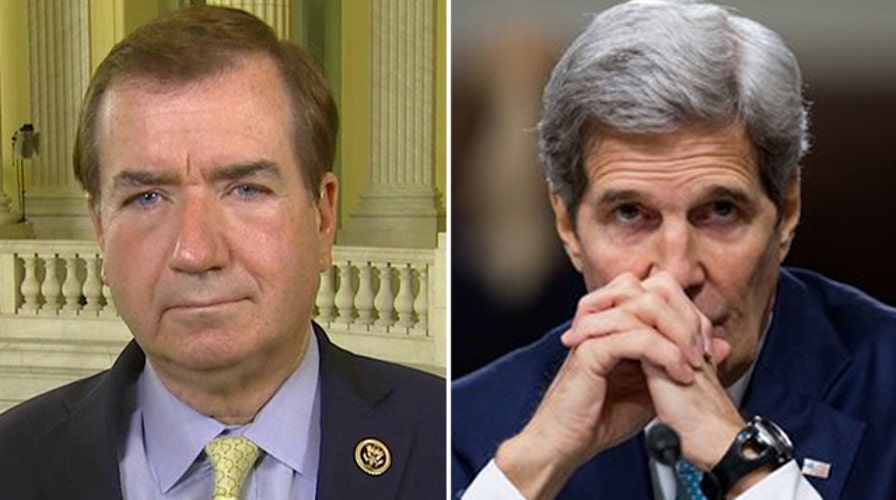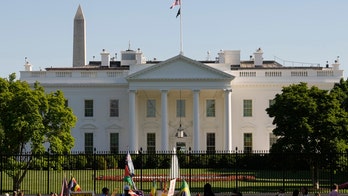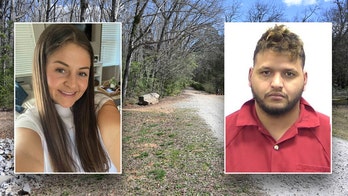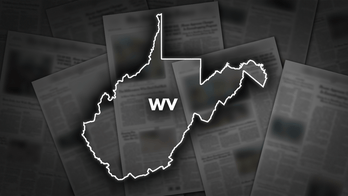Rep. Royce on Iran deal: How does this make US more secure?
House Foreign Affairs Committee chairman weighs in
WASHINGTON – Iran reportedly is insisting that its own officials be able to take soil samples at a suspected nuclear site and may get its way, in the latest complication to raise concerns from Congress as the Obama administration tries to sell the newly struck nuclear deal.
The investigation into the Parchin military complex by the International Atomic Energy Agency is part of the overarching nuclear deal reached earlier this month between Iran and six world powers. Iran is accused of experimenting at Parchin with ways to detonate a nuclear weapon -- Iran denies any such work but has agreed to give the IAEA access.
Yet after several senators initially claimed Iran wanted to conduct its own soil sampling, officials confirmed to The Associated Press that the U.N. agency may indeed agree to these terms provided it is allowed to monitor the process, though a final agreement has not yet been reached.
The officials did not say what reasons Iran gave for wanting to take its own samples. The samples would be analyzed by the agency for traces left by any nuclear experiments.
The reports emerged as three top Obama Cabinet members involved in the deal testified Tuesday morning before the House Foreign Affairs Committee.
At the hearing, Chairman Ed Royce, R-Calif., challenged the notion that the deal is "verifiable" or "enforceable." Rather, he said, lawmakers are being asked to consider giving Iran permanent sanctions relief -- a "cash bonanza" -- in exchange for temporary nuclear restrictions.
"Iran has cheated on every agreement they've signed," Royce said.
Iran's cooperation with the IAEA, and particularly the Parchin site, has been an area of concern for lawmakers in the weeks since the agreement was announced.
According to The Washington Free Beacon, Sen. James Risch, R-Idaho, earlier chided Secretary of State John Kerry and Energy Secretary Ernest Moniz about the site: "Let me tell you the worst thing about Parchin. What you guys agreed to was, we can't even take samples there. IAEA can't take samples there. They're going to be able to test by themselves. Even the NFL wouldn't go along with this."
Kerry and Moniz, along with Treasury Secretary Jacob Lew, testified on the House side on Tuesday.
Iran has refused to give IAEA experts access to people, documents and sites allegedly linked to the suspected weapons work for nearly a decade. But in its quest for the end to nuclear-related sanctions, it agreed earlier this month to work with the agency, and IAEA chief Yukiya Amano has said he expects to be able to deliver a report by December.
The alleged weapons work and the IAEA's investigation are not central to the nuclear deal, which calls for the U.S. and other world powers to end economic and military sanctions in exchange for concessions from Iran in its nuclear program. Tehran says its program is entirely peaceful, but the U.S. and most other nations believe it is aimed at acquiring nuclear weapons.
Still, U.S. lawmakers skeptical of the deal see the matter of whether the U.N. agency will receive full cooperation from Iran as a core issue.
Congress began a 60-day review of the accord last week. Lawmakers, under a law passed earlier this year, will be able to vote to approve or disapprove of the deal, or take no action.
The suspected explosives testing at Parchin, south of Tehran, is only one of 11 alleged cases of nuclear weapons-related work listed by the IAEA, based on U.S., Israeli and other intelligence and its own research. Tehran insists Parchin is a conventional military area with no link to nuclear tests. In recent years, it has carried out major construction and paving at the site where the alleged experiments took place, while refusing dozens of IAEA requests for a visit.
At Tuesday's hearing, administration officials also pushed back against the allegation the deal would ease crippling sanctions forever in exchange for temporary concessions on weapons development.
Kerry said that under the deal, Iran is "permanently banned" from developing a nuclear weapon, and many of the restrictions imposed would be in place "not just for 15 or 20 years, but for the lifetime" of its nuclear program.
Apart from Royce, the panel's senior Democrat expressed reservations about the plan. Rep. Eliot Engel of New York said he has "serious questions and concerns about this deal."
The hearing also unfolded as the American Israel Public Affairs Committee, a pro-Israel lobby, dispatched hundreds of its members to prod lawmakers to disapprove of the deal. On the other side of the issue, seven former U.S. diplomats and State Department officials sent a letter Monday to leaders in Congress urging them to support the pact.
The Associated Press contributed to this report.





